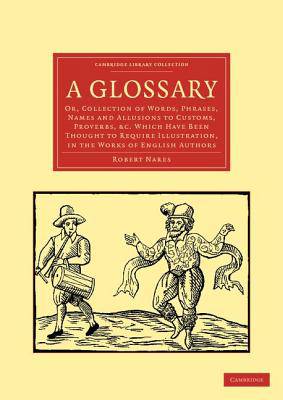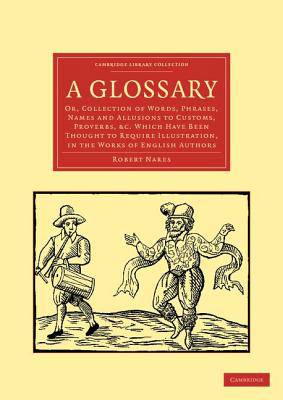
Bedankt voor het vertrouwen het afgelopen jaar! Om jou te bedanken bieden we GRATIS verzending (in België) aan op alles gedurende de hele maand januari.
- Afhalen na 1 uur in een winkel met voorraad
- In januari gratis thuislevering in België
- Ruim aanbod met 7 miljoen producten
Bedankt voor het vertrouwen het afgelopen jaar! Om jou te bedanken bieden we GRATIS verzending (in België) aan op alles gedurende de hele maand januari.
- Afhalen na 1 uur in een winkel met voorraad
- In januari gratis thuislevering in België
- Ruim aanbod met 7 miljoen producten
Zoeken
A Glossary
Or, Collection of Words, Phrases, Names and Allusions to Customs, Proverbs, etc. Which Have Been Thought to Require Illustration, in the Works of English Authors
Robert Nares
€ 127,45
+ 254 punten
Omschrijving
Originally published in 1822, Robert Nares' glossary of antiquated Elizabethan terms is the result of a personal interest in and love of Elizabethan literature. Nares (1753-1829), well known as a scholar and clergyman, was also a keen philologist and antiquary. This glossary was undertaken in his spare time, and compiled over forty years as he was often occupied with various academic and clerical duties, including founding the British Critic and editing it for twenty years (1793-1813), and becoming Keeper of Manuscripts at the British Museum (1799-1807). It has long been a useful guide for the 'average reader' (in his own words), as its several reprintings during the nineteenth century demonstrate. His love of the English language was reflected in his previous work, Elements of Orthoepy (1784), which concerned itself with ascertaining correct pronunciation from Shakespeare's time onwards and exploring contemporary variations in the language.
Specificaties
Betrokkenen
- Auteur(s):
- Uitgeverij:
Inhoud
- Aantal bladzijden:
- 598
- Taal:
- Engels
- Reeks:
Eigenschappen
- Productcode (EAN):
- 9781108035996
- Verschijningsdatum:
- 24/11/2011
- Uitvoering:
- Paperback
- Formaat:
- Trade paperback (VS)
- Afmetingen:
- 210 mm x 297 mm
- Gewicht:
- 1410 g

Alleen bij Standaard Boekhandel
+ 254 punten op je klantenkaart van Standaard Boekhandel
Beoordelingen
We publiceren alleen reviews die voldoen aan de voorwaarden voor reviews. Bekijk onze voorwaarden voor reviews.









